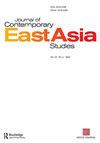Korean peace building and Sino–US relations: an “Ad-hoc” concert of interests?
IF 1.4
Q1 AREA STUDIES
引用次数: 2
Abstract
ABSTRACT The Korean Peninsula is perceived by both the United States (US) and China as the region where they could cooperate despite other disputed problems. The Four-Party Talks were proposed amid a crisis in the Taiwan Strait in 1996, and the Six-Party Talks were convened during the controversies over the subsequent Iraq War in early 2000s. The author argues whether this “Ad-hoc Concert” still survives as an analytic framework for examining Sino–US relations on the Korean Peninsula, notwithstanding the new dimension of collective security as a result of Democratic People’s Republic of Korea (DPRK, North Korea)’s nuclear issues with respect to the United Nation Security Council (UNSC). This paper first examines the Chinese initiatives in the nuclear crisis in 2016–17; it makes an assessment of the developments of the triangulated US–China–DPRK relationship after Chairman Kim Jongun referred to the “denuclearization of the Korean Peninsula” in early 2018. In the successive Summit meetings that Kim Jongun held with the Republic of Korea (ROK, South Korea)’s President Moon Jaein, and US President Donald Trump, the declaration to end the Korean War dominated those in the triangulated relations. This paper also reviews the controversies related to that declaration and their implication for Sino–US relations. Those implications will provide the basis for an analysis of Sino–US relations on the Korean Peninsula following a speech delivered by US Vice-President Mike Pence in October 2018 that was widely seen as a declaration of a “new cold war” between the US and China.朝鲜半岛和平建设与中美关系:“临时”利益协调?
摘要美国和中国都认为,尽管存在其他有争议的问题,但朝鲜半岛是他们可以合作的地区。四方会谈是在1996年台湾海峡危机期间提出的,六方会谈是在2000年代初关于随后的伊拉克战争的争议期间召开的。作者认为,尽管朝鲜民主主义人民共和国(朝鲜、朝鲜)在联合国安理会(UNSC)的核问题带来了新的集体安全层面,但这场“特设音乐会”是否仍然是审视中美在朝鲜半岛关系的分析框架。本文首先考察了中国在2016-17年核危机中的举措;它评估了2018年初金委员长提到“朝鲜半岛无核化”后,美中朝三角关系的发展。在金与大韩民国总统文在寅和美国总统唐纳德·特朗普连续举行的峰会上,结束朝鲜战争的宣言主导了三角关系。本文还回顾了与该宣言有关的争议及其对中美关系的启示。这些影响将为分析中美在朝鲜半岛的关系提供基础。2018年10月,美国副总统迈克·彭斯发表了一场被广泛视为美中之间“新冷战”宣言的演讲。
本文章由计算机程序翻译,如有差异,请以英文原文为准。
求助全文
约1分钟内获得全文
求助全文
来源期刊

Journal of Contemporary East Asia Studies
Social Sciences-Cultural Studies
CiteScore
2.50
自引率
0.00%
发文量
10
审稿时长
6 weeks
 求助内容:
求助内容: 应助结果提醒方式:
应助结果提醒方式:


